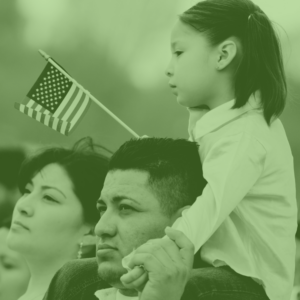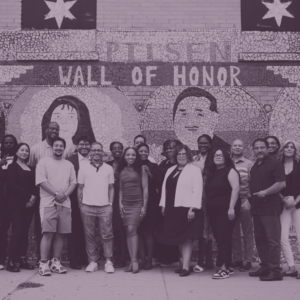by Delilah Quintana, Civic Engagement Intern
I walked in and instinctively looked around hoping to find at least one more person who I felt looked like me, whose story resonated with my own, whose fears and struggles I could understand— I was looking for another Latino(a).
Growing up in a city as diverse as Chicago, I believed diversity is what I would find among my classmates my first day of graduate school at the Jane Addams College of Social Work. I was wrong. The numbers were small enough to count on one hand, and that feeling of being the token Latina in a classroom began to sink in.
Research findings from the National Center for Higher Education Management Systems reflect what I experienced in my program: sixteen percent of all 18-year-olds in the U.S. are Latino and only 7% of U.S. college degrees are awarded to Latinos.
What would that mean for me? Would I have to reframe how I spoke? Did it mean I needed to be more aware of my clothing, or find a way to blend in?
This feeling is common. As Juana Bordas writes in her book The Power of Latino Leadership, we allow ourselves in the classroom, the workplace, and community to accept the lie that “success for Latinos meant cloning the behavior and thinking patterns that White society  taught in schools and other institutions.”
taught in schools and other institutions.”
Before working with the Forum’s Illinois Latino Nonprofit Leadership Academy, I too believed this myth.
This misconception of what I needed to become in order to be successful changed when I helped with my first Leadership Academy workshop as an intern for the Forum. I was no longer the only Latina in a room of professionals, I was now among 40 professional Latinos and Latinos de Corazon—people who, as Juana describes, can experience and incorporate valued aspects and become Latinos by affinity.
Meeting these new people and hearing about their bold work was inspiring. Leaders who are first-generation Americans, leaders who stood with other civil rights activists, leaders who were the first in their families to graduate from college, and leaders who fought against oppression so we could all benefit—these were the leaders I had the pleasure of learning from.
It was the first step into seeing the possibilities my own future could hold.
No longer did I see my place in the classroom as less than equal to my peers, rather it became a place to be bold, to educate my peers, and a place I hope to one day see many more Latinos filling. As leaders we bring more than our titles into a room, we bring our hearts, our culture, and our background. It is our job to bring change in the community and no longer fear being a token but to use that space as a platform for the work and change we too can offer.
The network I gained from this experience was invaluable to me as an individual and as a professional. Although I was not a participant in the Leadership Academy I still benefited from the trainings, networking, and reflection process that are part of the program.
I would encourage anyone who is able to apply to be a part of the Illinois Latino Nonprofit Leadership Academy so that they too could experience the quality trainings and networking.
The Leadership Academy taught me more than how to plan an event; it taught me to embrace who I am as a Latina and my importance in my community.




